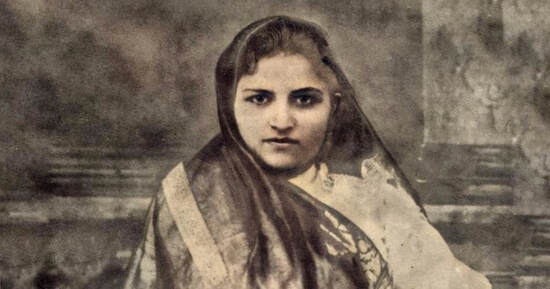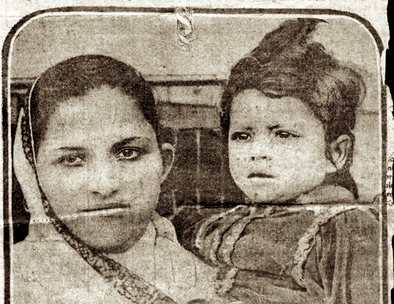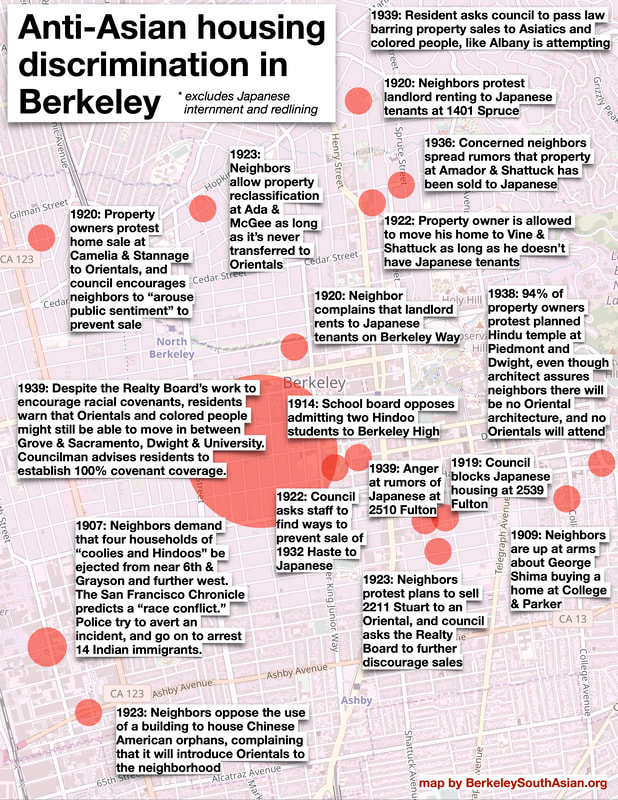Kala Bagai Way in Downtown Berkeley
1. Who was Kala Bagai?

Kala Bagai (1892-1983) was one of the first South Asian women on the West Coast, and an early immigrant activist and community-builder.
Kala Bagai was born in Amritsar in colonized India, immigrated to the Bay Area from Peshawar in modern day Pakistan. She survived anti-immigrant attacks in Berkeley, and then went on to build, in Southern California, one of the earliest South Asian communities in the United States. Her story is an opportunity to share with our children a powerful example of resilience and community in the face of oppression.
Kala Bagai and her husband immigrated to the U.S. from present-day Pakistan in 1915. The Bagais built a small business in the Bay Area and bought a home in Berkeley. When they arrived at the home with their children and their belongings, their neighbors physically barred them from moving in.
She survived local racism only to have an anti-immigrant court ruling stripped all South Asians of their citizenship. Her husband, now a stateless person, killed himself out of despair.
But Kala Bagai persisted in the face of oppression, raising children, remarrying, and going on to become a critical California immigrant leader. Nicknamed “Mother India,” she worked tirelessly to build bridges through arts and community until her death in 1983.
Read Kala Bagai's story, in her granddaughter's own words.
Read more about Kala Bagai’s life via Angel Island Immigrant Voice, the South Asian American Digital Archive, Timeline, and The Aerogram. Or listen to a 1982 interview with Kala Bagai, or a 2013 interview with granddaughter Rani Bagai.
Kala Bagai was born in Amritsar in colonized India, immigrated to the Bay Area from Peshawar in modern day Pakistan. She survived anti-immigrant attacks in Berkeley, and then went on to build, in Southern California, one of the earliest South Asian communities in the United States. Her story is an opportunity to share with our children a powerful example of resilience and community in the face of oppression.
Kala Bagai and her husband immigrated to the U.S. from present-day Pakistan in 1915. The Bagais built a small business in the Bay Area and bought a home in Berkeley. When they arrived at the home with their children and their belongings, their neighbors physically barred them from moving in.
She survived local racism only to have an anti-immigrant court ruling stripped all South Asians of their citizenship. Her husband, now a stateless person, killed himself out of despair.
But Kala Bagai persisted in the face of oppression, raising children, remarrying, and going on to become a critical California immigrant leader. Nicknamed “Mother India,” she worked tirelessly to build bridges through arts and community until her death in 1983.
Read Kala Bagai's story, in her granddaughter's own words.
Read more about Kala Bagai’s life via Angel Island Immigrant Voice, the South Asian American Digital Archive, Timeline, and The Aerogram. Or listen to a 1982 interview with Kala Bagai, or a 2013 interview with granddaughter Rani Bagai.
2. Why do we need a Kala Bagai Way?
|
Asian Americans have been in Berkeley for over a century, and make up 20% of the city.
But you would never know it if you saw the names on our streets, parks and schools. As far as we know, there's not a single street in Berkeley named after an Asian American. Kala Bagai is exactly the right person for us to honor at this moment:
The City of Berkeley is trying to find the perfect name for a two-block stretch of Shattuck Avenue. So far, the "Kala Bagai Way" proposal has:
|
3. Who supports a Kala Bagai Way?

The Berkeley City Council has received letters of support from a variety of sources. Some excerpts:
Corrina Gould, Confederated Villages of Lisjan/Ohlone:
"When the opportunity to participate in the Shattuck Avenue name change came up, the Tribe wholeheartedly supported the name change to Kala Bagai Way, because we want to acknowledge that there have been, and continue to be, people who come to our territory, who have faced and resisted oppression, and whose stories should be lifted up and remembered.”
Rani Bagai, Kala Bagai's granddaughter:
"Berkeley residents may have driven Kala from the city a century ago, but this street naming would be a homecoming. It would be a way to not only address the hurt that she and others like her must have felt being pushed out, but a way to honor her for the positive force she ended up being for her community as she organized with neighbors and new immigrants, choosing to ignore hate, and focus on inclusiveness, friendship, and our global commonality." (read her full op-ed)
Liam O'Donoghue, East Bay Yesterday:
"…the current lack of Berkeley streets named after Asian Americans in a city that prides itself on diversity is an unfortunate situation that should be remedied immediately.…naming the street after Bagai would be an opportunity to confront one of the more shameful aspects of Berkeley’s past -- this city’s history of racial housing discrimination. Although the kind of overt discrimination that Bagai faced is now illegal, more subtle forms of racism continue to plague the Bay Area’s housing market, which is all the more reason to shine a light on this history in order to learn from past mistakes."
Samip Mallick, South Asian American Digital Archive:
"I write on behalf of the South Asian American Digital Archive (SAADA) to share our excitement about the proposal to rename two blocks of Shattuck in honor of Kala Bagai, a pioneering immigrant woman who helped shape the South Asian community in California.…Feeling trapped and without a country to call his own, Kala’s husband committed suicide in 1928, leaving behind his wife and three young sons…And yet she continued on, becoming a pillar in the South Asian community in California…Kala’s story is a reminder of the tangible human impact of immigration policy, and the resilience and strength of the immigrant spirit. Renaming the two blocks of Shattuck in Kala Bagai’s honor would not just be an opportunity to address a historical absence, it would also be a sign to young South Asian Americans that they have a place in America’s story yesterday, today, and tomorrow."
Asian and Pacific Islander Americans in Historic Preservation:
"Her story is a powerful example of resilience and resistance in the face of oppression. Kala Bagai was a pioneer, the first in a long line of Indian immigrant women and community leaders. She represents stories of empowerment, community engagement, and resilience as a South Asian American, as a woman of color, as an immigrant, and as a member of the Sikh faith community."
Chris Carlsson and LisaRuth Elliot, ShapingSF:
"We support the renaming of two blocks of Shattuck Avenue for Kala Begai…Her story, with roots during the WWI-era efforts of local Indian immigrants to launch an independence movement against British imperialism in San Francisco (and the West Coast more generally), highlights the horribly racist immigration policies that were developed and implemented AFTER her family arrived and began a new life as American citizens.…I can think of few more appropriate ways to help shine a bright public light on a range of complicated histories than by renaming the street, and amplifying the saga with historic markers and explanations. At this time of out-of-control xenophobia and race-baiting, highlighting the generations-long saga of an immigrant family from South Asia that crisscrosses and overlaps our own tangled local histories, will be an important act of deep recognition and an honest attempt at reconciliation across the decades."
Corrina Gould, Confederated Villages of Lisjan/Ohlone:
"When the opportunity to participate in the Shattuck Avenue name change came up, the Tribe wholeheartedly supported the name change to Kala Bagai Way, because we want to acknowledge that there have been, and continue to be, people who come to our territory, who have faced and resisted oppression, and whose stories should be lifted up and remembered.”
Rani Bagai, Kala Bagai's granddaughter:
"Berkeley residents may have driven Kala from the city a century ago, but this street naming would be a homecoming. It would be a way to not only address the hurt that she and others like her must have felt being pushed out, but a way to honor her for the positive force she ended up being for her community as she organized with neighbors and new immigrants, choosing to ignore hate, and focus on inclusiveness, friendship, and our global commonality." (read her full op-ed)
Liam O'Donoghue, East Bay Yesterday:
"…the current lack of Berkeley streets named after Asian Americans in a city that prides itself on diversity is an unfortunate situation that should be remedied immediately.…naming the street after Bagai would be an opportunity to confront one of the more shameful aspects of Berkeley’s past -- this city’s history of racial housing discrimination. Although the kind of overt discrimination that Bagai faced is now illegal, more subtle forms of racism continue to plague the Bay Area’s housing market, which is all the more reason to shine a light on this history in order to learn from past mistakes."
Samip Mallick, South Asian American Digital Archive:
"I write on behalf of the South Asian American Digital Archive (SAADA) to share our excitement about the proposal to rename two blocks of Shattuck in honor of Kala Bagai, a pioneering immigrant woman who helped shape the South Asian community in California.…Feeling trapped and without a country to call his own, Kala’s husband committed suicide in 1928, leaving behind his wife and three young sons…And yet she continued on, becoming a pillar in the South Asian community in California…Kala’s story is a reminder of the tangible human impact of immigration policy, and the resilience and strength of the immigrant spirit. Renaming the two blocks of Shattuck in Kala Bagai’s honor would not just be an opportunity to address a historical absence, it would also be a sign to young South Asian Americans that they have a place in America’s story yesterday, today, and tomorrow."
Asian and Pacific Islander Americans in Historic Preservation:
"Her story is a powerful example of resilience and resistance in the face of oppression. Kala Bagai was a pioneer, the first in a long line of Indian immigrant women and community leaders. She represents stories of empowerment, community engagement, and resilience as a South Asian American, as a woman of color, as an immigrant, and as a member of the Sikh faith community."
Chris Carlsson and LisaRuth Elliot, ShapingSF:
"We support the renaming of two blocks of Shattuck Avenue for Kala Begai…Her story, with roots during the WWI-era efforts of local Indian immigrants to launch an independence movement against British imperialism in San Francisco (and the West Coast more generally), highlights the horribly racist immigration policies that were developed and implemented AFTER her family arrived and began a new life as American citizens.…I can think of few more appropriate ways to help shine a bright public light on a range of complicated histories than by renaming the street, and amplifying the saga with historic markers and explanations. At this time of out-of-control xenophobia and race-baiting, highlighting the generations-long saga of an immigrant family from South Asia that crisscrosses and overlaps our own tangled local histories, will be an important act of deep recognition and an honest attempt at reconciliation across the decades."
4. Kala Bagai Way in the media
July 2022:
May 2021:
Feb 2021:
December 2020:
November 2020:
October 2020:
September 2020:
July 2020 April 2020 March 2020: November 2019:
May 2021:
- Time: The Overlooked History of Angel Island, Where the U.S. Enforced Rules Designed to Keep Asian Immigrants Out
- India Currents: "Kala Bagai Way: The First Street In the US Named After a Historic Indian American Woman"
Feb 2021:
- Daily Cal: "Downtown Berkeley street renamed after South Asian immigrant Kala Bagai"
- American Kahani: Part of the Famous Shattuck Avenue in Berkeley, Calif., Renamed After its First Indian Immigrant – Kala Bagai
- The South Asian Times: Downtown Berkeley street renamed after Indian American immigrant Kala Bagai
- MESH India: Kala Bagai Way, Berkeley
December 2020:
- AsaAm News: "Street named in Berkeley to honor Indian woman"
- The Better India: "100 Years After Racist Attacks, Why Berkeley Named a Street After This Indian Woman"
- Makers India: "This Indian Woman Has a Road Named After Her in the US. Find Out Why"
November 2020:
- NavBharat Times: “गोरों के देश में काला कैसे बनीं मदर इंडिया”
- No Filter: "Kala Bagai : The Second Indian-American To Get A Street Named After Her In USA"
October 2020:
- Asian Americana: Kala Bagai audio documentary
- Telugu Times: “అగ్రరాజ్యంలో ఓ వీధికి భారతీయురాలి పేరు!”
- Prime9: “అమెరికా వీధికి భారతీయురాలి పేరు“
- TNILive: "అమెరికాలో వీరమహిళ"
September 2020:
- KQED: "Berkeley Renames Downtown Street 'Kala Bagai Way' After South Asian Immigrant Activist"
- UC Berkeley alumni association: "Shattuck Avenue East Renamed After Immigrant Activist Kala Bagai"
- Daily Cal: "Berkeley street to be named after early South Asian immigrant"
- The Juggernaut: "How Kala Bagai Came Home"
- The Times of India: "Berkeley honors Kala Bagai amid hosannas for Kamala Harris"
- Scroll: "A century after she was pushed out of her home by racists, a US city is honouring ‘Mother India’"
- The Quint: "Berkeley Names Street After Kala Bagai: Kin Tells Activist’s Story"
- The American Bazaar: "Berkeley street named Kala Bagai Way after ‘Mother India’"
- AH1: "Berkeley renames portion of major street after 'Mother India'"
- ASATA: Celebrating Kala Bagai Way"
- India Times: "US Street Named After Kala Bagai, An Indian Woman Pushed Out Of Her Home By Racist Neighbours"
- She the People TV: "A Street In California Named After Indian-American Woman Kala Bagai"
- CurlyTales: “USA Names A Street On An Indian Woman Who Faced Racism”
- Ei Samay Gold: "আমেরিকার মাদার ইন্ডিয়া কালা বাগাইকে চেনেন?"
- Prohor: "'মাদার’ ইন্ডিয়া'র নামে নামাঙ্কিত হল আমেরিকার রাস্তা; শতবর্ষ আগের অন্যায়ের প্রায়শ্চিত্ত?"
July 2020 April 2020 March 2020: November 2019:
